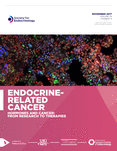Repositioning therapy for thyroid cancer: new insights on established medications
- Department of Pediatrics, Uniformed Services University of the Health Sciences, 4301 Jones Bridge Road, Bethesda, Maryland 20814-4712, USA
1Division of Endocrinology, Department of Medicine, Washington Hospital Center, 110 Irving Street Northwest, Washington, District of Columbia, USA
- Correspondence should be addressed to V Vasko; Email: vasyl.vasko{at}usuhs.edu
Abstract
Repositioning of established non-cancer pharmacotherapeutic agents with well-known activity and side-effect profiles is a promising avenue for the development of new treatment modalities for multiple cancer types. We have analyzed some of the medications with mechanism of action that may have relevance to thyroid cancer (TC). Experimental in vitro and in vivo evidences, as well as results of clinical studies, have indicated that molecular targets for medications currently available for the treatment of mood disorders, sexually transmitted diseases, metabolic disorders, and diabetes may be active and relevant in TC. For instance, the derivatives of cannabis and an anti-diabetic agent, metformin, both are able to inhibit ERK, which is commonly activated in TC cells. We present here several examples of well-known medications that have the potential to become new therapeutics for patients with TC. Repositioning of established medications for the treatment of TC could broaden the scope of current therapeutic strategies. These diverse treatment choices could allow physicians to provide an individualized approach to optimize treatment for patients with TC.
- repositioning therapy
- thyroid cancer
- cannabinoids
- valproic acid
- lithium
- nelfinavir
- chloroquine
- arsenic
- statins
- metformin
- Revision received 3 January 2014
- Accepted 17 January 2014
- Made available online as an Accepted Preprint 20 January 2014
- © 2014 Society for Endocrinology












